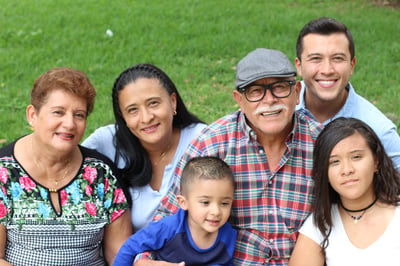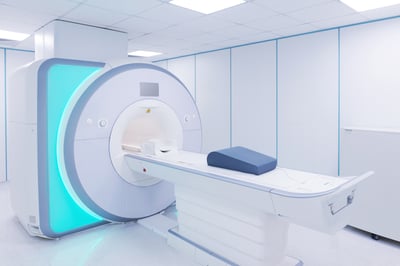FORCE's eXamining the Relevance of Articles for You (XRAY) program looks behind the headlines of cancer news to help you understand what the research means for you.
XRAY is a reliable source of hereditary cancer research-related news and information.
Learn more about the XRAY program
In portal: Breast Cancer, Categories Cancer Risk
Relevance: Medium-High


Strength of Science: Medium-High


Research Timeline: Post Approval


Study : Knowing about an inherited BRCA mutation improves outcomes for women with breast cancer
Relevance: Medium-High


Strength of Science: Medium-High


Research Timeline: Post Approval


Most relevant for: Young women with, or at high risk for an inherited BRCA mutation
Inherited mutations in the BRCA1 and BRCA2 genes are linked to a high lifetime risk of breast and other cancers. This study shows that women who know that they have a BRCA mutation before they are diagnosed with breast cancer have improved outcomes including diagnosis at earlier stages and improved overall survival. (10/26/20)
Read More
Relevance: Medium-Low


Strength of Science: Medium-Low


Research Timeline: Human Research


Study : Dairy milk may slightly raise breast cancer risk
Relevance: Medium-Low


Strength of Science: Medium-Low


Research Timeline: Human Research


Most relevant for: Women who consume dairy or soy
Debate continues about whether consuming soy or dairy products increases breast cancer risk. This study looked at a large number of women and found no link between soy and breast cancer risk. The study did find that postmenopausal women who drank dairy milk have a small increase in breast cancer risk. (09/04/20)
Read More
Study : Among women with breast cancer, who should have genetic testing for an inherited mutation?
Most relevant for: Women diagnosed with breast cancer who do not know if they have an inherited mutation in a gene linked to breast cancer
Which breast cancer patients should consider genetic testing? Knowing whether you have an inherited mutation may inform the decisions you and your healthcare provider make about treatment. But it can also increase stress and anxiety. This XRAY reviews a study of how different guidelines affect genetic testing recommendations for people with breast cancer. (8/27/20)
Read More
Relevance: Medium-High


Strength of Science: Medium


Research Timeline: Human Research


Study : Insulin resistance linked to differences in breast cancer survival between Black and White women
Relevance: Medium-High


Strength of Science: Medium


Research Timeline: Human Research


Most relevant for: Black women
Black women are more likely to die from breast cancer compared to White women. More Black women have a condition called insulin resistance than White women. This study found that insulin resistance might be one of the reasons that Black women are more likely than White women to die from breast cancer. Additional research is needed to see if lowering insulin levels will improve breast cancer survival in Black women. (07/30/20)
Read More
Relevance: High


Strength of Science: Medium-High


Research Timeline: Post Approval


Study : What is the risk for a new breast cancer diagnosis in the other breast for women with a BRCA1, BRCA2 or TP53 mutation?
Relevance: High


Strength of Science: Medium-High


Research Timeline: Post Approval


Most relevant for: Women diagnosed with breast cancer who have a mutation in BRCA1, BRCA2 or TP53
For women who have been diagnosed with breast cancer, knowing their risk of breast cancer in the other (contralateral) breast can help them make decisions about surgery and screening. This study shows that women with an inherited mutation in BRCA1, BRCA2 or TP53 have an increased risk for contralateral breast cancer. This risk is highest in women with a TP53 mutation. (6/6/20)
Read More
Study : Racial and ethnic differences in genetic testing among young breast cancer survivors
Most relevant for: Women diagnosed with breast cancer at age 50 or younger
Genetic testing is recommended for most women who are diagnosed with breast cancer at age 50 or younger. In this study of young women with breast cancer, while the rates of genetic testing did not differ, the rates of women testing positive for an inherited mutation associated with breast cancer did vary between racial and ethnic groups. (2/27/20)
Este artículo está disponible en español.
Read More
Relevance: Medium-High


Strength of Science: Medium-High


Research Timeline: Human Research


Study : Cancer risk associated with inherited mutations in Lynch syndrome genes
Relevance: Medium-High


Strength of Science: Medium-High


Research Timeline: Human Research


Most relevant for: People with Lynch syndrome mutations
Lynch syndrome is the most common inherited cause of cancer affecting about 1 in 300 people. People with Lynch syndrome have an increased risk of colorectal endometrial and other cancers. A large study followed people with mutations in the Lynch syndrome genes MLH1, MSH2, MSH6 and PMS2 to determine the risk of other types of cancer. (2/21/20)
Read More
Relevance: Medium-High


Strength of Science: Medium-Low


Study : Do hair dyes or straighteners increase breast cancer risk?
Relevance: Medium-High


Strength of Science: Medium-Low


Most relevant for: Young women who use hair dye or straighteners
Many women use products to color or straighten their hair. A large U.S. study linked the use of permanent hair dye and straighteners to increased breast cancer risk, particularly among black women. This XRAY reviews the limitations of this study and highlights the need for additional research before accepting these conclusions. (1/29/20)
Read More
Study : Does eating meat affect breast cancer risk?
Most relevant for: Women with a family history of breast cancer
Eating meat has been suggested to increase breast cancer risk. The recent Sister Study looked at meat type, cooking methods and breast cancer risk in a study of 42,012 women. (9/10/19)
Read More.jpg)
Relevance: High


Strength of Science: Medium-High


Research Timeline: Post Approval


Study : MRI or mammograms for detecting breast cancer in families with unknown genetic mutations?
Relevance: High


Strength of Science: Medium-High


Research Timeline: Post Approval


Most relevant for: People with a personal or family history of cancer where no mutation has been found
MRI and mammograms are used together to detect breast cancer in high-risk women who test positive for a BRCA or other gene mutation that increases the risk for breast cancer. For women with a family history of breast cancer but no known genetic mutation, increased screening is recommended. But what method is best? A recent clinical trial in the Netherlands compared MRI and mammography for this population. (8/15/19)
Read More